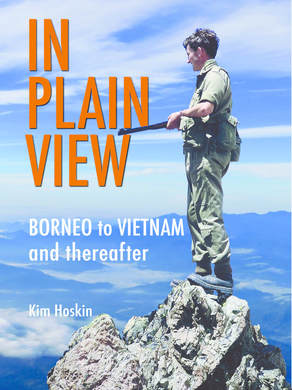Synopsis:
In Plain View is uncommon history. The undeclared wars in Borneo and Vietnam of half a century ago provided very different experiences. This is the personal story of a young officer, and those with whom he worked and lived, who participated in both conflicts.
It is a unique story in many respects, presenting back- ground, detail, and perspectives that are not commonly recorded elsewhere.
Joining 7th Gurkha Rifles, the writer arrived in Hong Kong just in time to deploy to Borneo as a platoon commander during Confrontation – the undeclared war with Sukarno’s Indonesia.
Seconded to the Sarawak Constabulary as a Divisional Border Scouts Officer, he was the last expatriate officer to join the force.
An unpretentious rapport with the upriver tribal communities enabled him to refine the role of the Border Scouts in Sarawak’s Fifth Division who subsequently played a significant part in the defeat of the last incursion.
Subsequently joining the New Zealand Army, the story shifts to Vietnam and that of an ANZAC Battalion Intelligence Officer developing intelligence systems and practices for unit counter-insurgency operations from first principles, some of which have curious parallels in today’s world. Reflecting his Borneo experience, forging relation- ships with those in the local community ‘outside the wire’ was an important part of his Vietnam story. He was, as he writes, often ‘out and about’.
One of his several unsanctioned initiatives was to co-opt the support of the Provincial Reconnaissance Unit, a clandestine Vietnamese paramilitary organisation with which he operated in the mangrove swamps of the Rung Sat Secret Zone, part of the Saigon River estuary.
However, this is not a story of bombs and bullets, but of an attempt to understand and to find ways of looking inside; to initiate what would later be called intelligence-led operations. The account of the writer’s reconciliation and reconnection with both places and the people in them forms a fitting postscript to the story. Despite the subject matter, humour and humanity are never far beneath the surface. Its writing style belies yet compliments the writer’s trade.
Publication Date: 25 April 2020
Price: $78.00
Size: 160mm x 240mm
Extent: 696 Pages
Illustrations: 65 B/W Photos
Binding: Cased & Dust Jacketed
ISBN: 978-0-9941059-6-7
In Plain View is uncommon history. The undeclared wars in Borneo and Vietnam of half a century ago provided very different experiences. This is the personal story of a young officer, and those with whom he worked and lived, who participated in both conflicts.
It is a unique story in many respects, presenting back- ground, detail, and perspectives that are not commonly recorded elsewhere.
Joining 7th Gurkha Rifles, the writer arrived in Hong Kong just in time to deploy to Borneo as a platoon commander during Confrontation – the undeclared war with Sukarno’s Indonesia.
Seconded to the Sarawak Constabulary as a Divisional Border Scouts Officer, he was the last expatriate officer to join the force.
An unpretentious rapport with the upriver tribal communities enabled him to refine the role of the Border Scouts in Sarawak’s Fifth Division who subsequently played a significant part in the defeat of the last incursion.
Subsequently joining the New Zealand Army, the story shifts to Vietnam and that of an ANZAC Battalion Intelligence Officer developing intelligence systems and practices for unit counter-insurgency operations from first principles, some of which have curious parallels in today’s world. Reflecting his Borneo experience, forging relation- ships with those in the local community ‘outside the wire’ was an important part of his Vietnam story. He was, as he writes, often ‘out and about’.
One of his several unsanctioned initiatives was to co-opt the support of the Provincial Reconnaissance Unit, a clandestine Vietnamese paramilitary organisation with which he operated in the mangrove swamps of the Rung Sat Secret Zone, part of the Saigon River estuary.
However, this is not a story of bombs and bullets, but of an attempt to understand and to find ways of looking inside; to initiate what would later be called intelligence-led operations. The account of the writer’s reconciliation and reconnection with both places and the people in them forms a fitting postscript to the story. Despite the subject matter, humour and humanity are never far beneath the surface. Its writing style belies yet compliments the writer’s trade.
Publication Date: 25 April 2020
Price: $78.00
Size: 160mm x 240mm
Extent: 696 Pages
Illustrations: 65 B/W Photos
Binding: Cased & Dust Jacketed
ISBN: 978-0-9941059-6-7
BOOK REVIEW
IN PLAIN VIEW - Borneo to Vietnam and thereafter
Reviewed by Captain Jeremy Seed ED, MIR, BA(Hons), for the New Zealand Army News, August 2021
Reviewed by Captain Jeremy Seed ED, MIR, BA(Hons), for the New Zealand Army News, August 2021
Kim Hoskin is widely regarded as one of the fathers of not just the contemporary New Zealand Intelligence Corps (NZIC) but operational intelligence within the modern NZ Army. This personal account of his early life and operational service in Borneo and Vietnam provides a fascinating view of his evolution and development from young infantry officer into savvy intelligence officer and leader.
Born and raised in the post-war United Kingdom, Kim Hoskin joined the British Army as an infantry private. Coming across almost as a Victorian gentleman explorer, Hoskin had a deep curiosity about Asia and the world beyond Europe. Hoskin’s wanderlust and thirst for adventure was satisfied with a commission in the Gurkhas, a posting to Hong Kong and his first deployment to Borneo during Confrontation
When this book first arrived on my desk, I assumed the publisher had sent me two copies, so large was the box it came in. At 600+ pages, my first thought was that Kim needed to have engaged a good editor and I was worried that it would be a story that could have been told in half the number of pages. But, and this is significant, Hosking writes in such a casual and engaging way that before you know it, you are deep in the Borneo jungle and deep into the fascinating story of how his passion and interest for intelligence was awakened and grew from his first tentative entry into the jungle until he was planning and leading operations against the Indonesians.
Following an unconventional period working with local forces in Borneo, Hoskin subsequently joined the RNZIR and deployed to Vietnam as IO with one of the ANZAC Battalions. Vietnam was a very different operational environment to Borneo and it was here that Hoskin developed and honed his craft at the Battalion level. Much of what he describes as SOPs for operational intelligence formed the bulk of what I was taught as a young NZIC trainee in the early 1990s.
My NZIC background though isn’t the sole reason I enjoyed this memoir. Hoskin’s narrative style is engaging and the book is a fascinating insight into the very different ways two conflicts were waged, one mans unconventional military career and the evolution of operational intelligence in the New Zealand Army in the cold war era. In Plain View is thoroughly recommended to anyone with an interest in the development of operational intelligence in the NZ Army and anyone looking for a well told story of post war soldiering with plenty of the unconventional or different about it.
Born and raised in the post-war United Kingdom, Kim Hoskin joined the British Army as an infantry private. Coming across almost as a Victorian gentleman explorer, Hoskin had a deep curiosity about Asia and the world beyond Europe. Hoskin’s wanderlust and thirst for adventure was satisfied with a commission in the Gurkhas, a posting to Hong Kong and his first deployment to Borneo during Confrontation
When this book first arrived on my desk, I assumed the publisher had sent me two copies, so large was the box it came in. At 600+ pages, my first thought was that Kim needed to have engaged a good editor and I was worried that it would be a story that could have been told in half the number of pages. But, and this is significant, Hosking writes in such a casual and engaging way that before you know it, you are deep in the Borneo jungle and deep into the fascinating story of how his passion and interest for intelligence was awakened and grew from his first tentative entry into the jungle until he was planning and leading operations against the Indonesians.
Following an unconventional period working with local forces in Borneo, Hoskin subsequently joined the RNZIR and deployed to Vietnam as IO with one of the ANZAC Battalions. Vietnam was a very different operational environment to Borneo and it was here that Hoskin developed and honed his craft at the Battalion level. Much of what he describes as SOPs for operational intelligence formed the bulk of what I was taught as a young NZIC trainee in the early 1990s.
My NZIC background though isn’t the sole reason I enjoyed this memoir. Hoskin’s narrative style is engaging and the book is a fascinating insight into the very different ways two conflicts were waged, one mans unconventional military career and the evolution of operational intelligence in the New Zealand Army in the cold war era. In Plain View is thoroughly recommended to anyone with an interest in the development of operational intelligence in the NZ Army and anyone looking for a well told story of post war soldiering with plenty of the unconventional or different about it.

